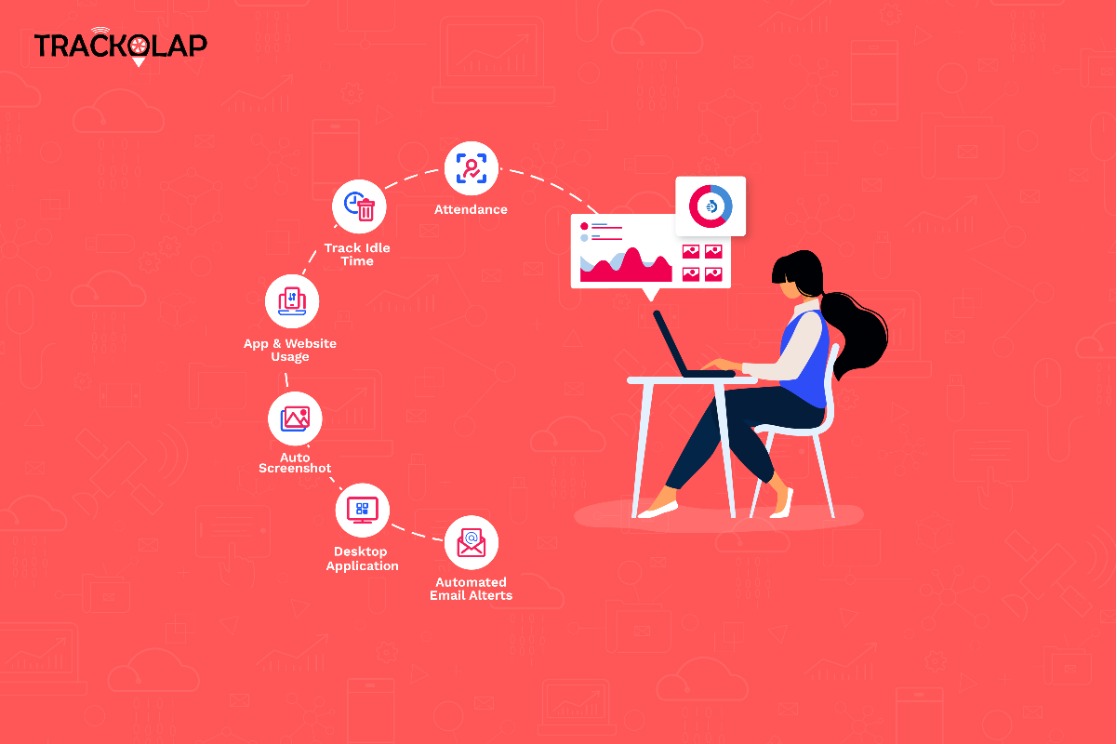
Is Remote Working Actually Beneficial for Your Business? Let’s Know From the Real Remote Work Statistics
Recently, the COVID-19 pandemic has clearly dictated ‘how companies benefit when employees work remotely.’ The companies that have already enforced the remote work policies in their workplaces—haven’t affected much during the lockdown. Maybe that’s why 77% of the workforce wants to continually work remotely at least once a week, even after the pandemic is over.
Remote work might be an appealing concept, but many organizations are still reluctant to use it. They aren’t convinced about the fact how remote work can benefit their operations? So, in this post, we are going to learn—is remote work good for your business based on the real remote work statistics?
Is Remote Work Good for Your Business?
The benefits of working from home 2020 have been a big topic at the TrackOlap office. We have launched desktop monitoring software in 2020 to improve the remote working environment for small as well as big companies. And we have also gathered different remote work statistics throughout the pandemic year. Our experts have found a remote work environment highly beneficial for multiple business domains.
But, the actual question is whether remote work beneficial for your business or not?
Many companies have experienced the benefits of working from home 2020, but you’ll only believe when you first hand experience it—right? You know facts never lie; thus, today, we are going to use facts and statistics to show—is remote work good or not?
How Companies Benefit When Employees Work Remotely?
If you are ready to introduce remote work culture in your business, but you have some concerns regarding your remote business efficiency. Then, let’s clear all your doubts by learning from the companies that have already achieved success through remote work solutions.
Health Benefits of Working Remotely
When employees don’t have to spend long hours on physical commute daily, they will have more spare time to work on their health. One average working professional in India has to spend 1.47 hours travel to reach their workplace daily. With remote work, you can free up almost two hours of your employees' time, which they can use to exercise, meditate, and connect with their family members.
If your employees are physically and mentally healthy, it is eventually going to be beneficial for your business. In Indeed’s Remote Work Survey, it is concluded that 50% of remote employees said working from home has reduced their sick days, and 56% said it reduced their absences. When your employees are working from home, they will less be exposed to the germs and feel less exhausted, which will automatically improve their sick days.
Another Survey conducted by FlexJobs’s presenter that 86% of employees feel less stressed in the remote work environment. Additionally, 89% of workers confirmed that they have more time to think about their health due to remote working.
When your employees are enjoying the health benefits of working remotely, it is going to directly impact the productivity and efficiency level of your business. Furthermore, if you develop a custom remote work dashboard, you can even reduce down the stress level of your workers.
Talent Attraction and Retention Benefits
With remote work, you can improve employee attraction and retention rates. Today, you might attract good employees with aggressive marketing and handsome salary package, but attracting them and retaining them are two different concepts.
Based on the latest findings, 73% of employees are always open to new career opportunities. Out of which 33% are actually looking for new job opportunities. Now, it doesn’t mean that you can’t retain your employees today. If you create an effective remote technology-oriented software for your employees, you can improve employee retention rate as per these statistics –
According to Condecosoftware research, 52% of participated organizations have seen a positive retention rate with the remote work culture. The companies that encourage remote working have experienced 25% lower turnover as compared to the companies, according to OwlLab’s report. A survey conducted by Crain’s Future of Work showed that 78% of the HR professionals had claimed telecommuting and flexible schedules as the most effective non-monetary ways to retain employees.
Elevated Productivity Standards
Improved productivity is one of the most controversial benefits of remote work. It is controversial because productivity in a remote work environment is something that cannot be automatically achieved. Companies have to use the right tools and technologies to implement the remote work system—only then can they gain the maximum remote productivity.
For example, in remote work setup, it always worries companies whether employees are productive throughout the working hours or they are busy playing games on their computers. If employees were working in the physical space, the employer could have to make sure that employees don’t waste their time, but remotely it is difficult to determine unless they are using the remote monitoring software.
With software, employers can easily check the application usage of each employee to ensure that they only use tools that are required to work. However, if you find your employees wasting time at shopping or gaming sites, you’ll be immediately notified.
That why numerous studies and surveys stood in favor of remote work. Such as –
- As per the State of Remote Work report by OwlLabs, a 79% increase in the remote employees' productivity and focus can be seen.
- According to CoSo research, 52% of remote workers are less going to take time off as compared to office goers.
- Based on the FlexJobs survey, 65% of employees are more productive in their home office rather than in the traditional workplace.
- Averagely, remote employees work 1.4 more days per month than those who worked in the office, according to Airtasker research. That means remote employees have more time to work.
- It is found in the Global Workplace Survey that 85% of businesses have gained more productivity by practicing the flexible work model.
Diverse Workplace
With the remote work, the geographical barriers can be removed. Thus, you can bring diversity to your team by hiring remote employees from all around the globe. When the different cultures and faiths are mixed together, a globally successful business venture can be created.
As per the study conducted by the Journal of Financial Management—three researchers, Mayer, Whao, and Zhao, higher diversity can double the return rate of investment. The study was conducted among 3000 publicly traded companies in 2001-2014. Diversity is measured on the nine factors, including gender, sexual orientation, ethnicity, etc.
A mix of backgrounds tends to derive more original and objective perspectives as they help with problem-solving. Additionally, you can attract more diverse clients with the help of your diverse task force. For example, when you have French, Hindi, and Arabic speaking remote employees in your team, you can target clients from India, France, and UAE easily. Maybe that’s why Fortune 500 companies like Google, Amazon, and Airbnb hire freelancers for multiple job roles.
Reduce your Operational Costs
The top remote work benefit is saving money. The remote work culture has helped companies in saving money in two ways—they don’t have to spend money on office infrastructure, and they have to pay fewer salaries.
Firstly, if your employees are working from home, you don’t have to rent an office building, buy furniture, equipment, supplies, and so much more. All the money that you’ll use to run the office will be directly saved. Many people counter here that they have to invest in the remote work software to set up a virtual office, so it not like they are fully saving business operational money.
But that’s not true because the cost of getting a custom remote work software is very less than paying monthly bills and rents. Buying software is a one-time expense where you have to pay an electricity bill every month.
Secondly, when employees are working remotely, you just have to pay them the basic salaries only. You don’t have to pay any overtime, traveling, refreshment, or any other kind of monetary benefits.
If you aren’t compelled yet, check out some of the remote work cost-saving statistics –
- According to the Global Workplace Analytics Telework Savings Calculator, a company can save up to $11,000 per year because of telecommuting workers.
- Another Global Workplace Analytics data shows that 33% of employees prefer to work from home as compared to getting a pay raise.
- Telecommunication company Vodafone has stated that 61% of their global respondents have increased profits by hiring remote employees.
- Harvard Business Review 2014 has expressed that employers who hired remote employees have saved $1900 over nine months for each employee.
- One Stanford University study has revealed that remote culture supporting companies have a 25% lower turnover rate.
Is Remote Work Good?
Yes, all the facts, studies, and statistics have clearly stated that remote work is good. It doesn’t matter what type of business organization you are running; you can dramatically increase productivity, efficiency and reduce business operational costs with remote work.
If you want to gain all the remote work benefits, you can contact TrackOlap today and order remote monitoring and tracking software for your company.






























 Back to Blogs
Back to Blogs










 D-5 Sector-59, Noida, Uttar Pradesh (India)
D-5 Sector-59, Noida, Uttar Pradesh (India) contactus@trackolap.com
contactus@trackolap.com 7011494501
7011494501










